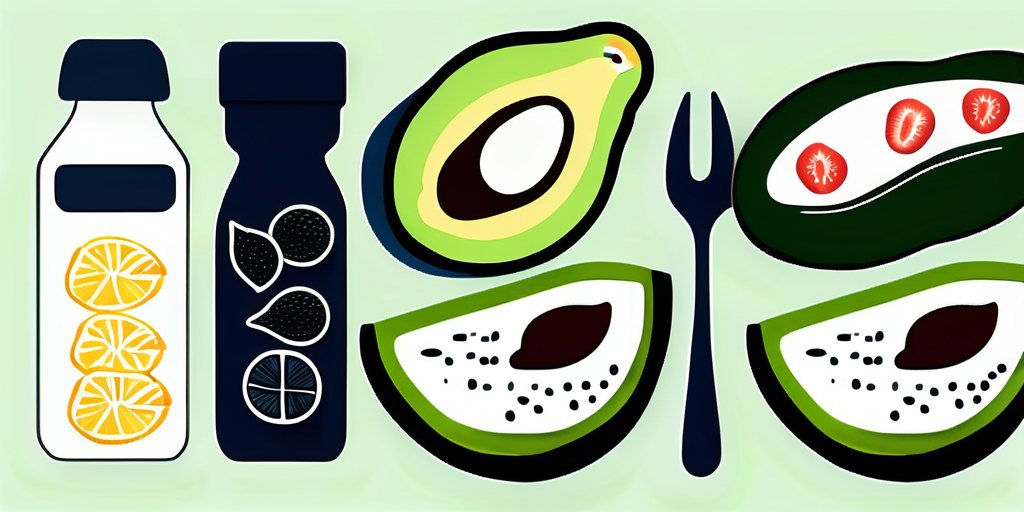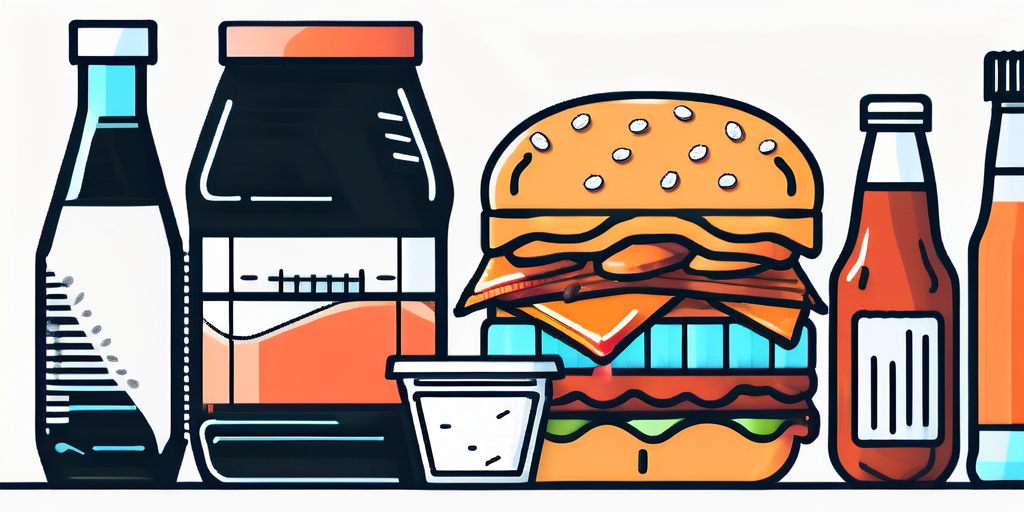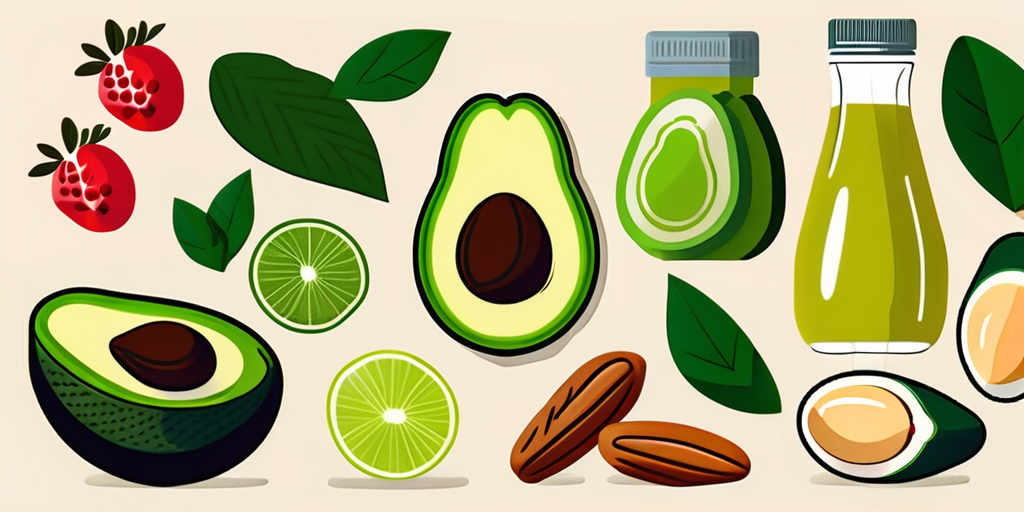In today's health-conscious world, finding effective ways to lose belly fat is a common goal for many individuals. Not only can excess belly fat affect our appearance, but it is also associated with various health risks. Fortunately, adopting a nutritious and balanced diet can play a significant role in reducing belly fat. By understanding the causes and concerns related to belly fat and incorporating specific foods into our daily diet, we can take steps towards achieving a flatter stomach and a healthier lifestyle.
Understanding Belly Fat: Causes and Concerns
Belly fat, also known as visceral fat, is a type of fat that accumulates around the abdomen. It is different from subcutaneous fat, which is found just beneath the skin. The accumulation of belly fat can be caused by various factors, including genetics, hormonal changes, stress, and a sedentary lifestyle. Regardless of the cause, excess belly fat is a concern as it is associated with an increased risk of heart disease, type 2 diabetes, and certain types of cancer.
The Science Behind Belly Fat
When we consume more calories than our body needs, the excess energy is stored as fat. The abdominal area is particularly prone to fat storage due to the presence of a large number of fat cells, known as adipocytes. These fat cells release hormones and inflammatory substances that can interfere with the body's metabolism, leading to weight gain and an increased risk of various health conditions.
Furthermore, the distribution of fat in the body is not uniform. Some individuals tend to store more fat in their abdominal area, while others may accumulate it in their hips or thighs. This variation is influenced by genetics, hormones, and lifestyle factors. For instance, high levels of the stress hormone cortisol can lead to increased belly fat storage.
In addition to the hormonal and genetic factors, a sedentary lifestyle can contribute to the accumulation of belly fat. Lack of physical activity not only leads to weight gain but also affects the body's ability to burn fat efficiently. Regular exercise, on the other hand, can help reduce belly fat by increasing metabolism and promoting the breakdown of stored fat.
Health Risks Associated with Belly Fat
Besides affecting our physical appearance, excess belly fat can have serious implications for our health. Research has shown that individuals with a high waist circumference are more likely to develop heart disease, high blood pressure, and insulin resistance. The fat cells in the abdominal area release chemicals that can interfere with insulin function, leading to elevated blood sugar levels and an increased risk of type 2 diabetes.
Moreover, belly fat is associated with chronic inflammation, which is a major contributing factor to various health problems. The inflammatory substances released by fat cells can trigger a systemic inflammatory response, affecting multiple organs and tissues. This chronic inflammation is linked to the development of cardiovascular disease, including atherosclerosis, and can also increase the risk of certain types of cancer.
It is important to note that the health risks associated with belly fat are not solely determined by the amount of fat present, but also by its distribution. Individuals with an apple-shaped body, characterized by excess fat around the abdomen, are at a higher risk compared to those with a pear-shaped body, where fat is mainly stored in the hips and thighs.
In conclusion, understanding the causes and concerns of belly fat is crucial for maintaining good health. While genetics and hormonal factors play a role, lifestyle choices such as regular exercise and a balanced diet can help reduce belly fat and minimize the associated health risks. It is important to consult with a healthcare professional for personalized advice and guidance on managing belly fat and maintaining a healthy weight.
Nutritional Approach to Losing Belly Fat
To effectively reduce belly fat, it's crucial to adopt a balanced and nutritious diet. Simply focusing on a specific food or relying solely on intense workouts may not yield the desired results. Instead, a holistic approach that combines a healthy eating plan with regular exercise is recommended for sustainable weight loss.
When it comes to losing belly fat, a balanced diet plays a significant role. A balanced diet consists of a variety of nutrient-dense foods that provide the body with the necessary vitamins, minerals, and macronutrients for optimal functioning. It should include a mix of carbohydrates, proteins, and healthy fats, in addition to an abundance of fruits and vegetables. By consuming a well-balanced diet, we can ensure that our body receives the essential nutrients while promoting weight loss and reducing belly fat.
Not only does a balanced diet help in losing belly fat, but it also offers numerous other health benefits. It can improve digestion, boost energy levels, enhance mood, and support overall well-being. By nourishing our bodies with the right combination of nutrients, we can optimize our metabolism and promote efficient fat burning.
Importance of Balanced Diet
A balanced diet is essential for maintaining a healthy weight and reducing belly fat. It provides the body with the necessary fuel to function optimally and supports the development of lean muscle mass. Consuming a variety of nutrient-dense foods ensures that we get all the essential vitamins and minerals needed for proper bodily functions.
Incorporating whole grains, lean proteins, and healthy fats into our diet can help control hunger and prevent overeating. Whole grains, such as quinoa and brown rice, are rich in fiber, which aids in digestion and keeps us feeling full for longer periods. Lean proteins, such as chicken, fish, and tofu, provide essential amino acids that support muscle growth and repair. Healthy fats, found in avocados, nuts, and olive oil, help regulate hormones and promote satiety.
Furthermore, a balanced diet that includes an abundance of fruits and vegetables provides essential vitamins, minerals, and antioxidants. These nutrients not only support overall health but also help reduce inflammation in the body, which can contribute to belly fat accumulation.
Role of Hydration in Weight Loss
While we focus on choosing the right foods, it's important not to overlook the role of hydration in weight loss. Drinking an adequate amount of water throughout the day helps maintain optimal body functions and aids in digestion. Staying hydrated is crucial for the body to break down food efficiently and absorb nutrients effectively.
Additionally, studies have shown that staying hydrated can boost metabolism and increase the number of calories burned. When we are properly hydrated, our body's metabolic rate increases, leading to more efficient fat burning. Adequate hydration also helps regulate appetite, as sometimes thirst can be mistaken for hunger. By drinking enough water, we can prevent overeating and support our weight loss efforts.
It's important to note that while water is the best choice for hydration, other beverages such as herbal teas and infused water can also contribute to overall fluid intake. However, it's best to avoid sugary drinks and excessive caffeine, as they can lead to dehydration and hinder weight loss progress.
In conclusion, adopting a nutritional approach to losing belly fat involves following a balanced diet that provides the body with essential nutrients. It's important to focus on consuming a variety of nutrient-dense foods, including whole grains, lean proteins, healthy fats, fruits, and vegetables. Additionally, staying hydrated by drinking an adequate amount of water throughout the day is crucial for supporting weight loss efforts. By combining a healthy eating plan with regular exercise, individuals can achieve sustainable weight loss and reduce belly fat effectively.
Top Foods for Belly Fat Reduction
Incorporating specific foods into our diet can be highly beneficial for losing belly fat. These foods are not only nutritious but also promote fat burning and satiety, making them excellent choices for those looking to shed excess weight around the waistline.

When it comes to achieving a slimmer waistline, one cannot underestimate the power of fruits and vegetables. These natural wonders are low in calories and high in fiber, making them excellent options for weight loss and belly fat reduction. Not only do they provide essential vitamins, minerals, and antioxidants that promote overall health, but their high fiber content also helps keep us feeling full for longer periods of time. By preventing overeating and snacking on unhealthy foods, fruits and vegetables become our allies in the battle against belly fat.
Fruits: Nature's Sweet Treats
Let's take a closer look at some of the fruits that can help us achieve a slimmer waistline. Berries, such as strawberries, blueberries, and raspberries, are not only delicious but also packed with fiber and antioxidants. These little powerhouses can help regulate blood sugar levels and reduce cravings for sugary treats. Additionally, citrus fruits like oranges and grapefruits are known for their high vitamin C content, which aids in fat burning and boosts the immune system.
Moreover, let's not forget about the wonders of vegetables. Leafy greens like spinach, kale, and Swiss chard are not only low in calories but also rich in vitamins A, C, and K. These nutrients help support healthy digestion and reduce bloating, making our waistline appear slimmer. Other vegetables like broccoli, cauliflower, and bell peppers are also great choices as they are packed with fiber and provide a satisfying crunch.
Lean Proteins and Their Impact on Belly Fat
While fruits and vegetables are essential for belly fat reduction, incorporating lean proteins into our diet is equally important. Foods such as chicken, turkey, fish, tofu, and legumes are excellent sources of lean protein. Protein is known to increase satiety and boost metabolism, making it an essential nutrient for weight loss. By including lean proteins in our meals, we not only feel satisfied but also support muscle growth and repair.
Furthermore, let's explore the benefits of specific lean proteins. Chicken and turkey are not only low in fat but also rich in essential amino acids that aid in muscle development. Fish, such as salmon and tuna, are packed with omega-3 fatty acids, which have been shown to reduce inflammation and promote a healthy heart. For those following a plant-based diet, tofu and legumes like lentils and chickpeas provide a great source of protein without the added saturated fats found in animal products.
Healthy Fats: Friend or Foe?
Contrary to popular belief, not all fats are harmful. In fact, incorporating healthy fats into our diet can aid in belly fat reduction. Foods rich in monounsaturated and polyunsaturated fats, such as avocados, nuts, seeds, and olive oil, can help reduce inflammation and improve heart health. These fats also play a role in keeping us feeling full and satisfied, making them an essential part of a balanced and nutritious diet.
Let's delve deeper into the world of healthy fats. Avocados, often referred to as nature's butter, are not only creamy and delicious but also packed with monounsaturated fats. These fats have been shown to reduce belly fat and lower cholesterol levels. Nuts and seeds, such as almonds, walnuts, chia seeds, and flaxseeds, are rich in omega-3 fatty acids and fiber. These nutrients not only promote a healthy heart but also help regulate blood sugar levels and curb cravings.
Lastly, let's not forget about the liquid gold known as olive oil. This staple of the Mediterranean diet is not only a flavorful addition to our meals but also a source of monounsaturated fats. Olive oil has been linked to a reduced risk of heart disease and may even aid in weight loss when used in moderation.
In conclusion, incorporating a variety of fruits, vegetables, lean proteins, and healthy fats into our diet can greatly contribute to belly fat reduction. By making these nutrient-rich foods a part of our daily routine, we can not only achieve a slimmer waistline but also improve our overall health and well-being.
Foods to Avoid for a Flatter Stomach
While certain foods can help us reduce belly fat, others can hinder our progress. It's important to be mindful of our food choices and avoid those that contribute to weight gain and abdominal fat accumulation.

Sugary Foods and Drinks
Sugary foods and drinks, such as soda, candy, pastries, and sweetened beverages, should be consumed in moderation or avoided altogether. These high-sugar foods provide empty calories and can lead to a rapid increase in blood sugar levels. Regular consumption of sugary foods is associated with weight gain and an increased risk of developing chronic conditions, including diabetes and heart disease.
Processed Foods and Their Impact on Your Waistline
Processed foods, including fast food, packaged snacks, and sugary cereals, are typically high in unhealthy fats, added sugars, and refined carbohydrates. These foods are often calorie-dense and lack essential nutrients. Regular consumption of processed foods can lead to weight gain and an increased risk of belly fat accumulation. Opting for whole, unprocessed foods is a better choice for overall health and belly fat reduction.
Incorporating Fat-Burning Foods into Your Daily Diet
Now that we have a solid understanding of the factors contributing to belly fat and the foods to avoid, let's explore practical strategies for incorporating fat-burning foods into our daily diet.

Meal Planning for Optimal Weight Loss
Meal planning is a useful tool when it comes to losing belly fat. By preparing meals ahead of time, we can ensure that our diet includes a variety of nutrient-dense foods and avoids unhealthy options. Aim for balanced meals that contain a combination of lean proteins, whole grains, fruits, vegetables, and healthy fats. Planning our meals also helps us avoid impulsive eating or reaching for convenient yet unhealthy options when we're hungry and pressed for time.
Snacking Strategies for Belly Fat Reduction
Snacking can be an important part of our daily routine, but choosing the right snacks is crucial for belly fat reduction. Instead of reaching for sugary or processed snacks, opt for healthier options such as nuts, seeds, Greek yogurt, or fresh fruits and vegetables. These snacks are not only satisfying but also provide essential nutrients and contribute to our overall health goals.
Overall, making smart food choices and adopting a balanced and nutritious diet is key to losing belly fat. By understanding the causes and concerns related to belly fat, incorporating specific fat-burning foods, and avoiding unhealthy options, we can take control of our waistline and work towards achieving a flatter stomach and improved overall health.




